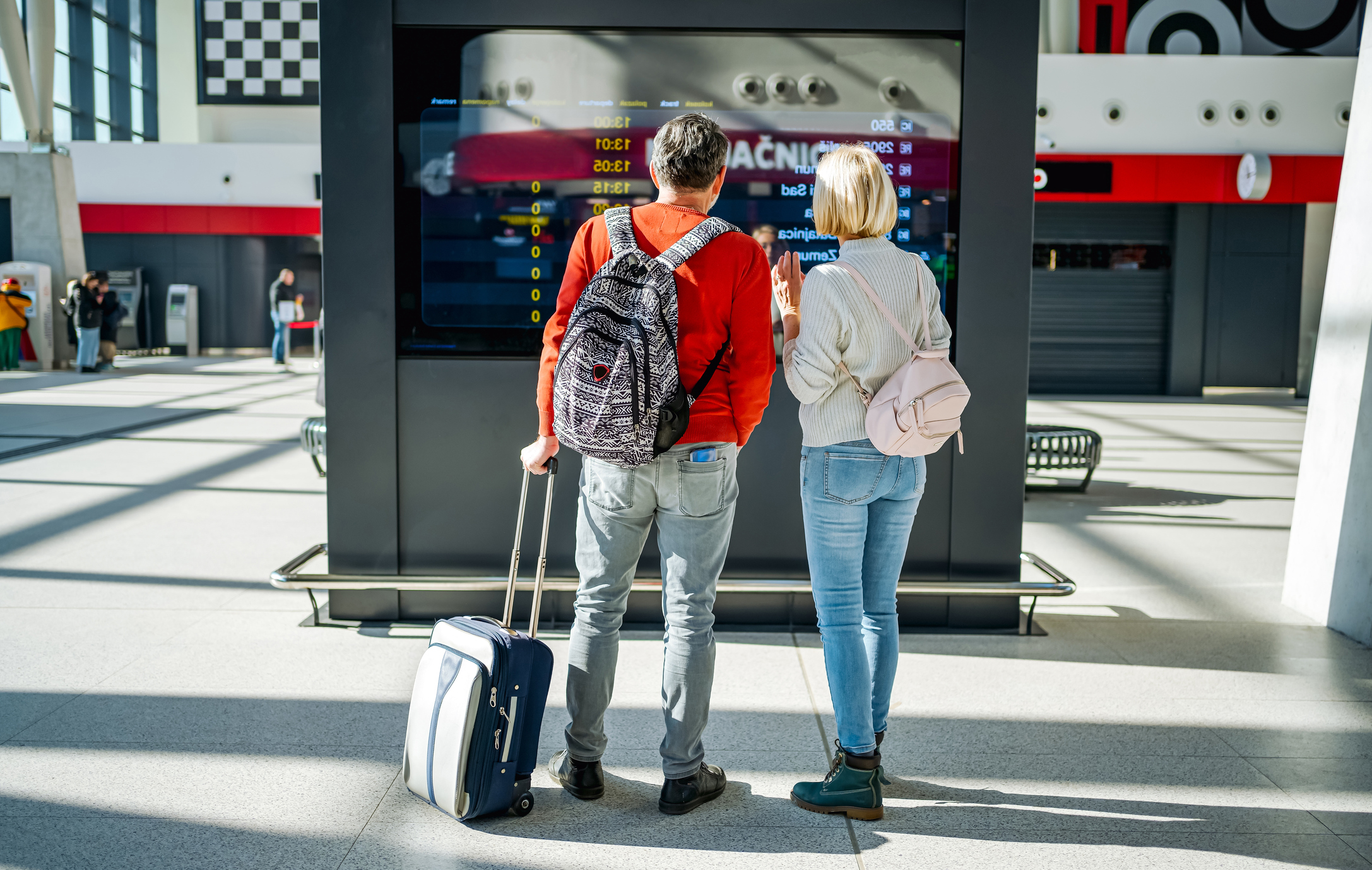When Is Travel Insurance Worth It?
Know when you need travel insurance and when you can skip it.

Erin Bendig
Profit and prosper with the best of Kiplinger's advice on investing, taxes, retirement, personal finance and much more. Delivered daily. Enter your email in the box and click Sign Me Up.
You are now subscribed
Your newsletter sign-up was successful
Want to add more newsletters?

Delivered daily
Kiplinger Today
Profit and prosper with the best of Kiplinger's advice on investing, taxes, retirement, personal finance and much more delivered daily. Smart money moves start here.

Sent five days a week
Kiplinger A Step Ahead
Get practical help to make better financial decisions in your everyday life, from spending to savings on top deals.

Delivered daily
Kiplinger Closing Bell
Get today's biggest financial and investing headlines delivered to your inbox every day the U.S. stock market is open.

Sent twice a week
Kiplinger Adviser Intel
Financial pros across the country share best practices and fresh tactics to preserve and grow your wealth.

Delivered weekly
Kiplinger Tax Tips
Trim your federal and state tax bills with practical tax-planning and tax-cutting strategies.

Sent twice a week
Kiplinger Retirement Tips
Your twice-a-week guide to planning and enjoying a financially secure and richly rewarding retirement

Sent bimonthly.
Kiplinger Adviser Angle
Insights for advisers, wealth managers and other financial professionals.

Sent twice a week
Kiplinger Investing Weekly
Your twice-a-week roundup of promising stocks, funds, companies and industries you should consider, ones you should avoid, and why.

Sent weekly for six weeks
Kiplinger Invest for Retirement
Your step-by-step six-part series on how to invest for retirement, from devising a successful strategy to exactly which investments to choose.

When you book a trip abroad, you might be considering whether it's worth it to pay for travel insurance. On the surface, travel insurance may seem like an unnecessary cost, particularly when fares are refundable or you have a travel rewards card that already provides some protection. But there are situations when its mandatory, as well as times when it’s not required but is still worth paying for.
From cancelled flights due to severe weather, a surprise illness or lost luggage, it makes sense to have contingencies in place for things that could happen.
While a credit card's travel insurance may be enough for some travelers, most cards only offer limited protections. So, here's a break down of what travel insurance covers, how much it costs and when it is (or isn't) worth it.
From just $107.88 $24.99 for Kiplinger Personal Finance
Become a smarter, better informed investor. Subscribe from just $107.88 $24.99, plus get up to 4 Special Issues

Sign up for Kiplinger’s Free Newsletters
Profit and prosper with the best of expert advice on investing, taxes, retirement, personal finance and more - straight to your e-mail.
Profit and prosper with the best of expert advice - straight to your e-mail.
What does travel insurance cover?
While some credit cards offer travel insurance, often, the coverage is limited. Sure, travel insurance through your credit card may cover the cost of your trip if its cancelled, but it likely won't cover expenses if you experience a medical emergency abroad.
By contrast, comprehensive travel insurance policies cover a wide range of expenses. A comprehensive travel policy typically includes several types of coverage all in one plan. This includes coverage for damage to rental cars, trip cancellation, medical expenses and lost luggage when you’re abroad.
Kiplinger Best Travel Cards
Travel cards help you rack up the points or miles fast, leading to sizable discounts on future trips. Explore our top options, powered by Bankrate. Advertising disclosure.
Another option is to combine the benefits that come with your travel rewards credit card (trip cancellation, lost luggage and trip delay coverage) with a travel medical insurance policy.
How much does travel insurance cost?
According to data from SquareMouth, a travel insurance comparison site, the overall average cost among all single trip travel insurance policies purchased on their site in 2025 is $309.
However, the amount you pay for a policy depends on a number of factors — the length of your trip, the number of travelers you need to insure, and even how old you are.
A better estimate is 4% to 11% of the total cost of a trip, experts say. You can compare plans at SquareMouth or TravelInsurance. Choose coverages that make sense for your trip, and be sure to read the fine print of any policy you consider.
Travel insurance policies generally fall into one of three tiers: basic, middle-tier and comprehensive coverage.
Although basic is often the most affordable option and includes benefits such as trip cancellation and lost baggage coverage, it may require that you pay a deductible in the event of sickness or injury. According to TravelInsurance.com, a basic coverage policy costs on average $103.
Middle-tier coverage typically includes the same benefits as basic policies but adds a health insurance benefit. A mid-range policy costs on average $124.
A more expensive, comprehensive policy includes both the benefits of basic or middle-tier policies, plus other benefits like accidental death coverage. However, with a comprehensive policy, you'll likely have to pay a higher claim limit. On average, a comprehensive policy costs $162.
Because older travelers are generally at higher risk of health problems, policies tend to be more expensive the older you are. An analysis conducted by AdvisorSmith, a small business resource website, estimated that the difference between a 40-year-old’s and 70-year-old’s average cost of travel insurance may come to about $100. But that doesn’t mean older folks can’t find affordable policies; shopping around and comparing plans is key.
When to buy travel insurance
If you are concerned about severe weather upending your trip, about a possible unexpected health incident involving you or a family member, a terrorist attack, or even losing your job, travel insurance policies with basic trip cancellation coverage often cover those reasons for cancelling.
Also, be sure to check the travel restrictions for any countries you are traveling to regularly; some countries still require travel insurance in order to visit.
Meanwhile, should you book your travel through a third-party website, like Expedia or Booking.com, check what the travel insurance covers and eligibility requirements.
Furthermore, if you're traveling outside the country, it’s always a good idea to purchase some form of travel medical insurance, even if you're in good health. This way, you won't have to pay out of pocket for any medical costs in the case of an accident or emergency.
Even if you have a U.S. health insurance plan, most provide little or no coverage abroad.
Faye Insurance offers travel insurance with 100% digital claims and real-time support.
Explore plans at www.withfaye.com.
When to skip travel insurance
Whether to pay for a travel insurance policy and what level of coverage you get depends on your personal risk tolerance, of course. But it also depends on whether you’ll have to pay a lot out of pocket if you have to cancel or postpone your plans.
If you’re mainly worried about losing money on costly international flights, for instance, think again before you pay to insure them. That also goes for travel insurance plans offered at checkout when purchasing a plane or train ticket.
Although it may seem like a small expense in exchange for the added flexibility, keep in mind that most airfares already have built-in flexibility.
Major U.S. airlines made permanent changes during the pandemic, allowing flexible bookings for most tickets. That means you won’t have to pay a fee if you need to change your flight — as long as you don’t buy the cheapest fares (Southwest allows free changes for all tickets).
Also, some travel providers offer flexibility on bookings made within a certain time. For instance, the major airlines and Amtrak offer a refund in the first 24 hours after a booking if you have to cancel or change your itinerary.
Also, when an airline cancels your trip — as long as the flight is arriving at and/or departing from a U.S. airport — you are legally entitled to a refund, per U.S. Department of Transportation regulations.
An airline will often automatically issue a credit or voucher for a cancelled flight, but be sure to request a refund if that is what you would prefer, as is your right. Also, if there has been a substantial schedule change (typically of two hours or more) and you decide not to take that flight, you are entitled to a refund of your fare.
Get more travel tips and other personal finance insights straight to your inbox. Subscribe to our daily newsletter, A Step Ahead.
Related Content
Profit and prosper with the best of Kiplinger's advice on investing, taxes, retirement, personal finance and much more. Delivered daily. Enter your email in the box and click Sign Me Up.

Emma Patch joined Kiplinger in 2020. She previously interned for Kiplinger's Retirement Report and before that, for a boutique investment firm in New York City. She served as editor-at-large and features editor for Middlebury College's student newspaper, The Campus. She specializes in travel, student debt and a number of other personal finance topics. Born in London, Emma grew up in Connecticut and now lives in Washington, D.C.
- Erin BendigPersonal Finance Writer
-
 The New Reality for Entertainment
The New Reality for EntertainmentThe Kiplinger Letter The entertainment industry is shifting as movie and TV companies face fierce competition, fight for attention and cope with artificial intelligence.
-
 Stocks Sink With Alphabet, Bitcoin: Stock Market Today
Stocks Sink With Alphabet, Bitcoin: Stock Market TodayA dismal round of jobs data did little to lift sentiment on Thursday.
-
 Betting on Super Bowl 2026? New IRS Tax Changes Could Cost You
Betting on Super Bowl 2026? New IRS Tax Changes Could Cost YouTaxable Income When Super Bowl LX hype fades, some fans may be surprised to learn that sports betting tax rules have shifted.
-
 How Much It Costs to Host a Super Bowl Party in 2026
How Much It Costs to Host a Super Bowl Party in 2026Hosting a Super Bowl party in 2026 could cost you. Here's a breakdown of food, drink and entertainment costs — plus ways to save.
-
 3 Reasons to Use a 5-Year CD As You Approach Retirement
3 Reasons to Use a 5-Year CD As You Approach RetirementA five-year CD can help you reach other milestones as you approach retirement.
-
 How to Watch the 2026 Winter Olympics Without Overpaying
How to Watch the 2026 Winter Olympics Without OverpayingHere’s how to stream the 2026 Winter Olympics live, including low-cost viewing options, Peacock access and ways to catch your favorite athletes and events from anywhere.
-
 Here’s How to Stream the Super Bowl for Less
Here’s How to Stream the Super Bowl for LessWe'll show you the least expensive ways to stream football's biggest event.
-
 The Cost of Leaving Your Money in a Low-Rate Account
The Cost of Leaving Your Money in a Low-Rate AccountWhy parking your cash in low-yield accounts could be costing you, and smarter alternatives that preserve liquidity while boosting returns.
-
 This Is How You Can Land a Job You'll Love
This Is How You Can Land a Job You'll Love"Work How You Are Wired" leads job seekers on a journey of self-discovery that could help them snag the job of their dreams.
-
 We Inherited $250K: I Want a Second Home, but My Wife Wants to Save for Our Kids' College.
We Inherited $250K: I Want a Second Home, but My Wife Wants to Save for Our Kids' College.He wants a vacation home, but she wants a 529 plan for the kids. Who's right? The experts weigh in.
-
 4 Psychological Tricks to Save More in 2026
4 Psychological Tricks to Save More in 2026Psychology and money are linked. Learn how you can use this to help you save more throughout 2026.

